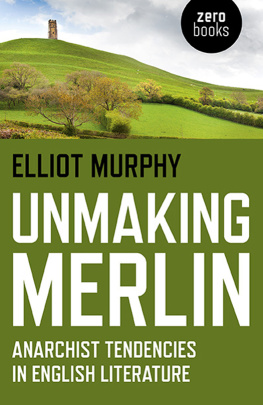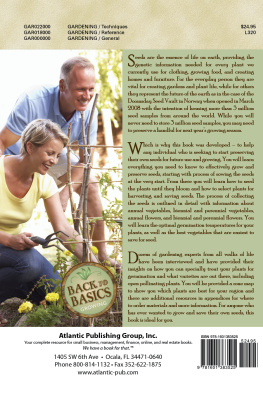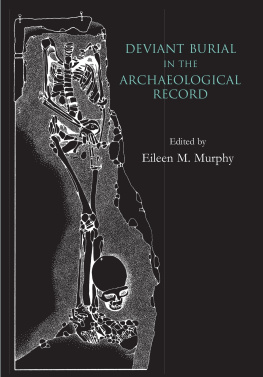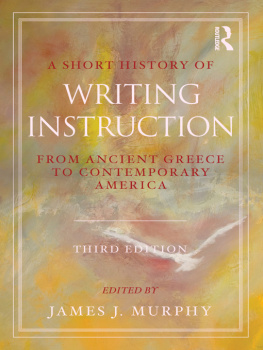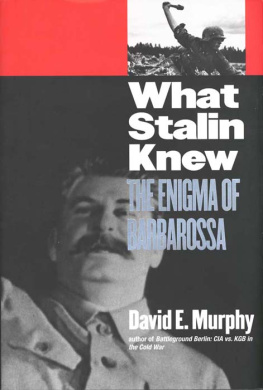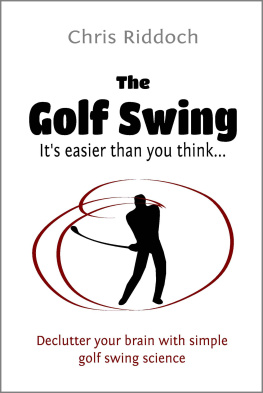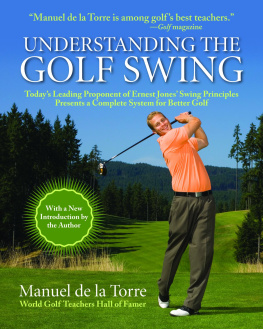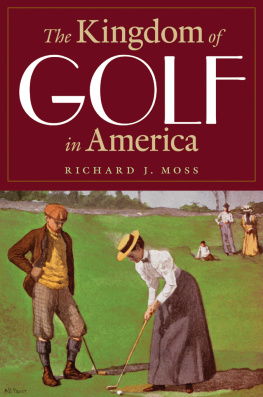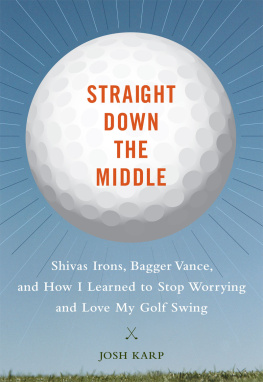
Golf in the Kingdom
Michael Murphy


Hell, from The Garden of Earthly Delights by Hieronymus Bosch. Shivas Irons claimed that Bosch played an early form of golf called kolven. This painting, he said, depicts the agonies the painter saw on those early golf courses.
For my parents,
John and Marie Murphy
The game was invented a billion years ago
dont you remember?
Old Scottish golf saying
PART ONE
Shivas Irons
IN SCOTLAND, BETWEEN THE Firth of Forth and the Firth of Tay, lies the Kingdom of Fifeknown to certain lovers of that land simply as The Kingdom. There, on the shore of the North Sea, lies a golfing links that shimmers in my memoryan innocent stretch of heather and grassy dunes that cradled the unlikely events which grew into this book. For reasons political and arcane I cannot tell you its real name, so will call it instead the Links of Burningbush. Maybe you have played it yourself and will recognize it from my description. But I must warn you that even its terrain and the name of the town in which it is located are veiled, for the members of the venerable golf club that governs those links are strangely threatened by the story I will tell.
There I met Shivas Irons, introduced to me simply as a golf professional, by accident one day in June 1956. I played a round of golf with him then, joined him in a gathering of friends that evening, followed him into a ravine at midnight looking for his mysterious teacher, watched him go into ecstatic trance as the sun came up, and left for London the following afternoonjust twenty-four hours after we had metshaken, exalted, my perception of things permanently altered.
The first part of this book is about that incredible day, seen again through fifteen years in which my memory of our meeting passed through unaccountable changes. How did he and his teacher carry on their experiments with consciousness and the structure of space during all those rounds of golf on the Burningbush Links without the players or greenkeepers ever knowing? Did he actually change shape and size as I seem to remember him doing, or was that a result of the traumas I went through then? Did he drive the eighteenth green some 320 yards away? Im fairly certain he did that. During the years since our meeting I have been haunted by questions like these. Our day together has gotten into my inner life, shaping and reshaping my memories, my attitudes, my perceptions. At times I almost think he is here in the flesh, his presence is so vivid, especially when I play a round of golf. Then I could swear he is striding down the fairways with me, admonishing or consoling me with that resonant Scottish burr or suggesting some subtle readjustment of my swing. His haunting presence leads me back to the game, in spite of all my prejudice against its apparent inanities. On a golf course I can begin to recreate that day in 1956.
Part two of this book is my attempt to make sense of some passages which I was fortunate enough to copy from his journals. For the man was a philosopher-poet and an historian of sorts. His sayings have stuck in my mind as well as the memory of his prodigious golf shots. Whatever led me to copy those sentences escapes me now. Like my meeting with him, I must put it down to unbelievably good luck. Or perhaps I knew, in some precognitive way, that I was not to see him again. For I have tried without success these several years to re-establish contact with him. In the town of Burningbush no one knows where he is or what he is doing. He is simplyas the barman at the ancient golf club saidat large in the world.
When I left Scotland after that memorable visit, I was on my way to India, to study philosophy and practice meditation at the ashram of the Indian seer Aurobindo. When I reached my destination, I became absorbed in the discipline I found there and the memory of my time in Burningbush began to recede. In that austere and devoted place adventures on golf courses seemed a frivolous waste of time. My rhetoric and interior dialogues then were clothed in the words of Aurobindo and Saint John of the Cross, Plotinus and Meister Eckhart. Hardly a notion or phrase from my conversations in Scotland crept in.
After a year and a half in India, I returned to California. It was then that Shivas Irons began to haunt me. I began to hear his voice, making the same suggestions he had made to me during our day together. Aye one fiedle afore ye eer swung, the sentence came like a litany. Sometimes I would hear him as I was falling asleep.
In the summer of 1961 Richard Price, a classmate from Stanford who had become fascinated with the latent possibilities of the mind, heard that I was living in San Francisco and came to see me. Before long we had conceived a plan for an institute in Big Sur, on my familys old estate there, and our dream soon became a reality of sortsnot the one we had talked about exactly, but something like it, something recognizably in the direction of an ashram and forum where East and West could meet. About that time memories of Shivas took an even stronger hold on me. That someone so mystically gifted should be a golf professionaland such a proficient onefilled me with increasing wonder. For the difficulties of remembering and embodying the higher life while laboring in the lower were becoming ever more apparent as our little institute took shape. Psychiatrists, hippies, and swingers, learned men from universities and research centers, wounded devoted couples and gurus from the end of the world were descending upon us in answer to our letters and brochures. We were caught in a social movement we hardly knew existed. New adventures of the spirit were beginning, of the spirit and the body, of the spirit and the bedroom, of encounter groups and endless therapiesa vast exploration of what my teacher Aurobindo had called the vital nature. Swept along in the heady river of The Human Potential, as we called it then, I came to admire what Shivas Irons had so firmly joined in his lifeall those worlds above and below that met in his remarkable golf swing, in the way he greeted friends at the bar of the Burningbush club.
One night in Big Sur, after a particularly rousing and exhausting session of something called psychological karate, I was drawn to the box of papers I had collected during my trip to India. I found the notes I had copied from his journals. Seeing them again in Big Sur, so far from the Kingdom of Fife, brought back the experience like a flood. Suddenly the feeling of it all, the smell of heather and those evanescent vistas of purple and green were there again in all their original intensity. For an hour or so I was in Scotland again, walking the cobblestone streets of that little town, smelling the salt air, looking out in some kind of satori from the hill above hole thirteen. The thrill of it was so deep, so full of blazing awareness that I wondered how I had forgotten. I was dumfounded, as I read through those notes, at my genius for repression.
I decided that the time had come to reestablish contact. The next day I wrote him a letter. Months passed without a reply. But my desire to hear from him continued to grow. I wrote a second letter sometime during the summer of 1964, but still there was no reply. I wrote a third to his friends the McNaughtons, but it was returned without a forwarding address. By then it was well into 1965 and I was caught up in the full tide of those Utopian days at our institute. We were becoming famous, at least in certain circles, and for a while it seemed that we were on the verge of some immense discovery. We were planning a Residential Program with a huge array of disciplines for stretching the human potential; the idea behind it was to develop astronauts of inner space who would break through to dimensions of consciousness not yet explored by the human race. At times we talked in terms of a Manhattan Project of the psyche. But it soon became evident that breakthroughs could be in the wrong direction, that we were in for a longer haul than some of us had thought. Our more ambitious programs began to founder as some of our astronauts came crashing back to earth, and we began to learn that the programing of consciousness was an unpredictable venture. This sobering change in perspective was reinforced by what we saw happening in the Big Sur country around us. Thousands of young people from all over the United States were coming down the coast highway looking for some final Mecca of the counter-culture, and during the summer of 1967, the Summer of Love, it seemed that most of them wanted to camp on our grounds. They came with dazed and loving looks, with drugs and fires, swarming into the redwood canyons and up over the great coast ridges, many of them polluting and stealing along the way. The air was filled with a drunken mysticism that undermined every discipline we set for the place. Late that summer I got hepatitis.
Next page

